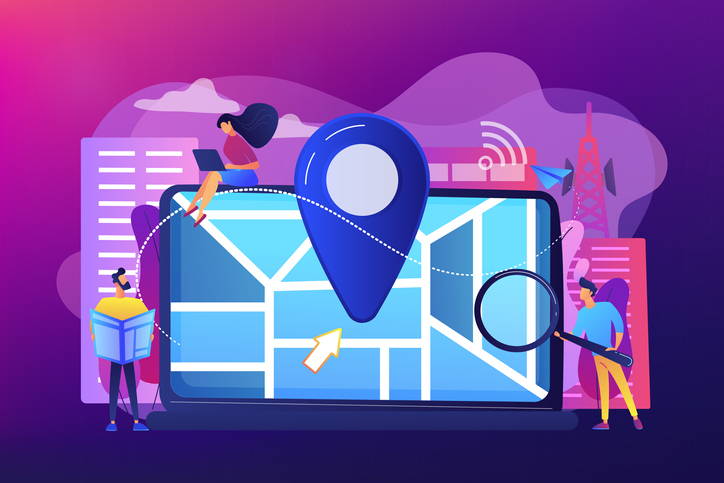Today's market is extremely competitive.
The first benchmark many SMBs set for themselves is going national; ever-changing algorithms can make digital marketing more challenging than one might anticipate; and it's tough to become visible amid the pool of competitors who've been creating Google listings for years.
This can be daunting for business owners just starting out; but a competitive market doesn't mean growth is impossible. With the right local search engine optimization (SEO) practices, you can meet your growth goals and then some.
Here's how local SEO can help you grow your business:
What is Local SEO?
The main purpose of SEO is to attain your website a better rank in search engine results pages (SERPs). Local SEO, then, encompasses a series of strategies that help increase your business' visibility in search results from your local area.
To attract a large number of visitors, your website must be indexed on Google's first page of search results; otherwise, you will miss out on being discovered by prospective customers. After all, around 75% of users don’t go beyond the first page on search engines.
Moreover, approximately 97% of users use a search engine to find local companies near them. Local SEO can help these people find your business before they find your competitors'.
How to Improve Local SEO
Some local SEO strategies can be applied directly to your website, such as:
- Create "contact" and "location" pages. These should include your company's full name, all addresses, phone numbers, email addresses and any other contact details.
- Include a map. This can make it even more convenient for the customers to locate you.
- Make contact information clickable. Clickable contact numbers and email addresses make it easier for customers to get in touch with you.
Before we dive deeper into local SEO strategies, keep in mind that they work best when combined with basic SEO practices. (Also read: 3 Tips for Developing an IT Marketing Strategy.)
With that said, here are more ways to improve local SEO:
Optimize Your Google Business Profile
Your Google Business Profile — previously known as your Google MyBusiness listing — permits your company to appear prominently on Google Maps and local SERPs.
Here's how to set up and optimize your Google Business Profile:
- Go to Google's Business Profile homepage. Click through the prompts and populate the dashboard with all the relevant and requested information. This data will be included in your Business Profile; and once you're done, your company's profile will appear in local searches and on Google Maps.
- Claim your listing. You will come across various duplicate listings over time. These replicas must be removed, and those that stay must include accurate and up-to-date data.
Ensure Citations are Consistent
Consistency will get you a long way, particularly when it comes to SEO. Consistent citations make it easier for consumers to find you and will also make you appear more credible.
For local SEO, you'll want to make sure the following remain consistent across all publications that reference you, including your own website and your Google Business Profile:
- Your business NAP (name, address, and phone number). If your company name ends in "LLC" or "Inc.," you must include that anywhere you put your name. Also, keep an eye out for how your street address and road number are written; varying abbreviations and spellings can hurt your SERP visibility.
- Your URL structure. If you remove prefixes like "www" or "https" in one place, make sure you remove them in all of them. These should be consistent across all publications.
Monitor Your Reviews and Request Feedback
Reviews can make or break a company's local SEO.
This is true for a number of reasons:
- Reviews take up more real estate in Google's search results.
- Positive testimony about your company can make your brand appear more credible and trustworthy — and that can contribute to higher rankings.
So how do you get positive reviews?
You can either provide a service or product so good customers want to leave positive feedback, or you can request reviews from your clients. In either case, it will benefit your company and SEO.
Make Localized Content
A regional and highly targeted content marketing strategy will help you rank higher in local search results. Some tips for this include:
- When creating content, include your town or city's name as well as any nicknames locals use for it. It can also be useful to include the names of places in the surrounding region to expand your reach.
- Discuss the most recent happenings and events in your community. This will benefit you by increasing your SEO and informing your audience about what's going on in the area.
- Sponsor local events. Financially supporting sporting events, cultural festivities or any other public event and covering them in your content can boost your local SEO.
- Interview local experts and share their viewpoints with your viewers.
One important note: While your material should be local, it should also be beneficial to your audience. The latter is the main attraction when it comes to content. (Also read: What Makes Web Content Go Viral?)
Obtain Local Backlinks
Backlinks serve two purposes:
- They help you reach the website owner's audience.
- They make your brand appear more trustworthy.
Both are key factors in improving your website's ranking in search engines.
To get local backlinks, you should first prioritize establishing and attracting local connections. Befriend companies that complement yours and who are not competing directly with you.
How do you do that?
Begin by communicating and interacting with them in the comments section of their website. Make thoughtful and useful comments. This will make your customers and the author regard you as an expert, attracting quality backlinks to your blog.
It's all about trying to reach your target audience however you can.
Another option is to use a backlink checker technique to evaluate your competitors' websites. This will help you identify websites that link to your competitors. Then, you can contact those website and explain why your brand is superior to others.
Backlink building is a time-consuming and sometimes hit-or-miss process, but a few high-performing backlinks go a long way.
Use Local Keywords
Keyword research is extremely important for optimizing your content for search engines.
Keywords are phrases your target audience searches for on the internet. These keywords could be one-word or an entire sentence (long-tail).
For local SEO, you'll want to target local keywords. To find local keywords, leverage a keyword research tool like Ahrefs or Semrush. These tools can help you locate the most popular phrases people in your area are typing into Google.
Once you know what people in your area are typing into search engines, your task is to integrate these phrases into your blog organically. This helps signal your website to a search engine's algorithm while ensuring your content's flow is not interrupted.
One thing to remember is that you should avoid stuffing your blogs with your target keywords. This is called "over-optimizing," and it will neither improve user experience nor help you rank higher. In fact, it may cause the search engine to prevent your website from getting indexed.
Use Social Media
When it comes to SEO, you should use all of the digital tools at your disposal. And social media is one of the most popular.
Having a strong social media presence makes your company appear more trustworthy, which can help you rank higher. Plus, social networking allows you to show a more emotional element of your brand while maintaining clarity.
Make sure your social media profiles are pertinent to both your location and your business. The information you add should be consistent across these channels. (Remember: regularity is key!)
Make a Separate Page for Every Product/Service
Cramming all of your goods and services onto a single page is very appealing. After all, it's quick and easy — for you.
However, to make things easier for your customers and for search engines, you should create a dedicated section with separate pages for each good/service you offer.
Think of it this way: If you only have one page with all your products and services listed, you only have one chance to rank in Google. But if you have separate pages for each product/service, you have many more chances to rank for many more keywords.
To illustrate, let's say you own a bakery in Toronto. With all your products listed on one page, your keyword list is pretty limited: "Toronto bakery," "Toronto desserts," or "Ontario bakery" may be some examples. But expand your product offering into multiple pages, and suddenly you can target "Toronto cupcakes," "Toronto pies," "Toronto birthday cake," "Toronto wedding cake" — the list goes on!
If you only have one product or service but multiple locations, create a separate page for each location and use location-based copy on the page.
For example, a home inspection company with multiple locations might create separate pages for "Toronto home inspections," "Montreal home inspections" and "Vancouver home inspections."
Leverage Online Local Business Directories
Online business directories provide two significant benefits to your local business:
- They help improve your local SEO.
- They help expand your visibility among your intended audience. Visibility can easily translate into increased foot traffic in your physical location.
However, keep the following in mind when adding your local company these business directories:
- Include the correct spellings of your company's name and address.
- Maintain consistency in your contact information.
- Include a well-written and detailed description of your company.
- Include a website URL.
Conclusion
Local SEO is similar to conventional SEO in some ways, but with the added emphasis on local keywords and audiences. In local SEO, everything — including your content, keywords and citations — should earmark you as a business in your area (and adjacent locations).
You can maintain local SEO by ensuring consistency, particularly when it comes to your contact information. However, with local SEO — as with conventional SEO — it's important to remember that best practices are always changing. The only foolproof local SEO strategy is one that changes with the trends. (Also read: 6 Signs That Mobile Is the New Key to Winning at SEO.)






